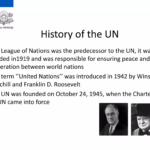Home Minister Chaired Northern Council Meeting: Basics Explained

A meeting of the Northern Zonal Council, chaired by Union Home Minister Amit Shah,was held at Rajasthan. The council comprises Haryana, Himachal Pradesh, Jammu and Kashmir, Punjab, Rajasthan, National Capital Territory of Delhi and Union Territory of Chandigarh.
Internal security, road, transport, industries, water, power and other issues of common interests are to be discussed at the meeting, official sources said.
LEARNING FROM HOME/WITHOUT CLASSES/ BASICS
The idea of creation of Zonal Councils was mooted by the first Prime Minister of India, Pandit Jawahar Lal Nehru in 1956 when during the course of debate on the report of the States Re-organisation Commission, he suggested that the States proposed to be reorganised may be grouped into four or five zones having an Advisory Council ‘to develop the habit of cooperative working” among these States.
COMPOSITION OF ZONAL COUNCILS
In the light of the vision of Pandit Nehru, five Zonal Councils were set up vide Part-III of the States Re-organisation Act, 1956. The present composition of each of these Zonal Councils is as under:
The Northern Zonal Council, comprising the States of Haryana, Himachal Pradesh, Jammu & Kashmir, Punjab, Rajasthan, National Capital Territory of Delhi and Union Territory of Chandigarh;
The Central Zonal Council, comprising the States of Chhattisgarh, Uttarakhand, Uttar Pradesh and Madhya Pradesh;
The Eastern Zonal Council, comprising the States of Bihar, Jharkhand, Orissa, Sikkim and West Bengal;
The Western Zonal Council, comprising the States of Goa, Gujarat, Maharashtra and the Union Territories of Daman & Diu and Dadra & Nagar Haveli;
The Southern Zonal Council, comprising the States of Andhra Pradesh, Karnataka, Kerala, Tamil Nadu and the Union Territory of Puducherry.
The North Eastern States i.e. (i) Assam (ii) Arunachal Pradesh (iii) Manipur (iv) Tripura (v) Mizoram (vi) Meghalaya and (vii) Nagaland are not included in the Zonal Councils and their special problems are looked after by the North Eastern Council, set up under the North Eastern Council Act, 1972. The State of Sikkim has also been included in the North Eastern Council vide North Eastern Council (Amendment) Act, 2002 notified on 23rd December 2002. Consequently, action for exclusion of Sikkim as member of Eastern Zonal Council has been initiated by Ministry of Home Affairs.
Committees Of Zonal Council
Each Zonal Council has set up a Standing Committee consisting of Chief Secretaries of the member States of their respective Zonal Councils. These Standing Committees meet from time to time to resolve the issues or to do necessary ground work for further meetings of the Zonal Councils.
ORGANISATIONAL STRUCTURE OF ZONAL COUNCILS
Chairman – The Union Home Minister is the Chairman of each of these Councils.
Vice Chairman – The Chief Ministers of the States included in each zone act as Vice-Chairman of the Zonal Council for that zone by rotation, each holding office for a period of one year at a time.
Members– Chief Minister and two other Ministers as nominated by the Governor from each of the States and two members from Union Territories included in the zone.
ROLE AND OBJECTIVES OF THE ZONAL COUNCILS
The Zonal Councils provide an excellent forum where irritants between Centre and States and amongst States can be resolved through free and frank discussions and consultations. Being advisory bodies, there is full scope for free and frank exchange of views in their meetings. Though there are a large number of other fora like the National Development Council, Inter State Council, Governor’s/Chief Minister’s Conferences and other periodical high level conferences held under the auspices of the Union Government, the Zonal Councils are different, both in content and character. They are regional fora of cooperative endeavour for States linked with each other economically, politically and culturally. Being compact high level bodies, specially meant for looking after the interests of respective zones, they are capable of focusing attention on specific issues taking into account regional factors, while keeping the national perspective in view.
The main objectives of setting up of Zonal Councils are as under :
Bringing out national integration;
Arresting the growth of acute State consciousness, regionalism, linguism and particularistic tendencies;
Enabling the Centre and the States to co-operate and exchange ideas and experiences;
Establishing a climate of co-operation amongst the States for successful and speedy execution of development projects.
In particular, a Zonal Council may discuss, and make recommendations with regard to:
any matter of common interest in the field of economic and social planning;
any matter concerning border disputes, linguistic minorities or inter-State transport;
any matter connected with or arising out of, the re-organization of the States under the States Reorganisation Act.




0 Comments